How to create a captivating network engineer resume?
It’s loud in the data center, but you actually enjoy it. You make sure that there are no flickering lights when checking the switch stack. Then you sit down and casually dive into planning and developing networks. It’s a walk in the park, right?
Well, actually, it’s not. Your work is quite challenging, and your role is extremely important to any organization. After all, you are the one responsible for a vital building block of a company’s IT system.
Whether you are a seasoned network engineer or you are trying to break into the field, you surely need to start with one thing to advance your career path — a well-crafted resume. Actually, it should be better than the other 199 CVs.
Stating the number of potential applicants might make it scarier, but it’s nothing you cannot do. Especially if you follow our handy guide on how to build a compelling network engineer resume.
Still looking for a job? These 100+ resources will tell you everything you need to get hired fast.
1. Formatting tips to spruce up your network engineer resume
Cables resembling “spaghetti junction” are probably nothing you haven’t seen. Having to swap out switches in a messy cabinet must be every network engineer’s nightmare.
Just like it is for a hiring manager to browse through badly formatted resumes.
Make your CV neat and easy to read, and draw a recruiter’s attention to key information.
- Set 0.5-1 inch margins on all sides.
- Employ negative space between individual resume sections to make your resume breathe as a cabinet after removing dead cabling.
- Use a two-column layout so that you effortlessly fit all your sections in 2 pages.
- List your work experience and education reverse-chronologically.
- Make sure you use bulleted lists for better clarity.
- Select a classic font such as Cambria, Arial or Calibri.
- Save your CV as a PDF document if the job posting doesn’t state otherwise.
Choose your preferred template and make your resume shine.
2. Create an eye-catching professional summary for your network engineer CV
An appealing and relevant professional profile can get the recruiter on your side. It is the first thing they lay their eyes on, but it as well might be the last one.
It all depends on how you market your network engineer experience.
A well balanced and attention-grabbing professional profile should certainly contain keywords from the job posting you are replying to. Use them in the right context and mention your best, related accomplishments and outstanding skills.
Remember to employ interesting adjectives and impactful verbs to make it all work together.
Here's an example of a strong network engineer professional summary
Knowledgeable and qualified Network Engineer with 7+ years of experience installing, configuring, and maintaining communication networks. Adept at monitoring network performance, completing backups, and improving quality and efficiency of network infrastructure. Offers Network+ and CCNP certification, great analytical skills, and excellent time management abilities. Increased reliability of networks by 10% and was awarded Employee of the Month twice.
3. The most effective skills to put on your network engineer resume
There’s no question that you know your stuff. You would be able to toss all your tech skills off before one says “VoIP”.
In order to effectively compile your skill-set, refer back to the job ad, and look for the requirements in it. Mention the desired programs and network types at the top of the list. This way you’ll make sure that your resume catches a recruiter’s eye.
The best network engineer hard skills to put on your resume
- Virtualization and Automation
- Programming languages
- Nexus Operating System (NX-OS)
- Cisco Technologies
- Cisco Security
- Cybersecurity
- CCNP
- SD-WAN
- DNS
- OSPF
- BGP
- FLETC
- VMware NSX
- F5 BigIP
The best soft skills for your network engineer CV
- Teamwork
- Problem solving
- Organization
- Leadership
- Motivation
- Analytical skills
- Outstanding communication
- Negotiation
- Flexibility
- Prioritizing
- Stress resilience
- Time management skills
- Interpersonal skills
- Perseverance
4. Strike a fair balance in your network engineer work experience section
Planning an effective work experience section can be a real bear. There are quite a few aspects to take into account when describing your past roles.
Your resume will most probably have to go past the ATS (Applicant Tracking System) scan at the beginning of the process.
This effectively means that you will need to optimize your resume with specific keywords from the job posting. This way you will ensure that it will be passed along to the hiring manager.
Stick to bullet points. It is a great way to spotlight your accomplishments, and if you can measure them, you’ve just won the pot. The more numbers the better. Quantifying makes your achievements more tangible.
Network engineer work experience section example
Bravestorm Solutions, Austin, Texas
Network Engineer
2017 – 2021
- Maintained communication networks, monitored network performance, and resolved any technical issues.
- Collaborated with colleagues on the improvement of network infrastructure in order to increase quality, reliability, effectiveness, and reduce expenses.
- Installed and configured network devices, including routers, modems, hubs, switches, wireless AP's, and WLAN controllers.
- Performed backups of all servers and provided support and assistance to users.
- Skillfully completed troubleshooting and tested networks.
- Increased reliability of networks by 10% and was awarded Employee of the Month twice.
5. Highlight your network engineer education section
Your prospective employer may typically require you to have at least a bachelor’s degree in computer science or computer engineering.
Have you gotten the required title? Great! However, it does not end there. What if another 199 candidates have the exact same education?
Well, then one way to jump ahead of other candidates could be to highlight your memorable academic achievements or areas of interest.
Listing education in your network engineer CV
Massachusetts Institute of Technology,United States
MA in Computer Science
2008-2013
- First Class Honours (Top 5% of the programme)
- Area of interest: Computing Architecture
- Clubs and Societies: Engineering Society, Math Society
6. Include the right extra sections in your network engineer resume
Your academic degree is not the only thing that qualifies you for the job you are applying for. It’s surely a combination of particular skills you have obtained through various activities and interests, moulding you into a self-driven network engineer.
Help your potential employer understand your character traits and aspirations through mentioning the most relevant extra sections.
- Certifications
- Accomplishments
- Volunteering activities
- Conferences
- Language Skills
- Computer science projects
- Interests
- Awards
Here are examples of how to properly list extra sections on your network engineer resume
Certifications
- CCNA (Cisco Certified Network Associate), 2016
- CCIE (Cisco Certified Internetwork Expert), 2015
- WCNA (Wireshark Certified Network Analyst), 2014
Volunteering Activities
- IT Support Volunteer, Local Non-Profit Organization
- Provided technical support to the organization's staff, assisting with troubleshooting hardware and software issues.
- Set up and maintained the organization's network infrastructure, ensuring smooth and secure connectivity.
- Conducted training sessions on basic computer skills and cybersecurity awareness for staff and volunteers.
- Mentor, Tech Youth Program
- Mentored high school students interested in pursuing careers in technology, providing guidance and support.
- Assisted students with computer networking projects, troubleshooting network configurations, and implementing solutions.
- Organized workshops and guest speaker events to inspire and educate students about the field of network engineering.

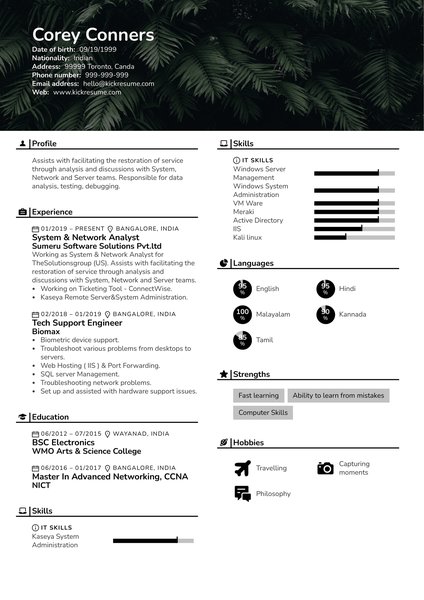

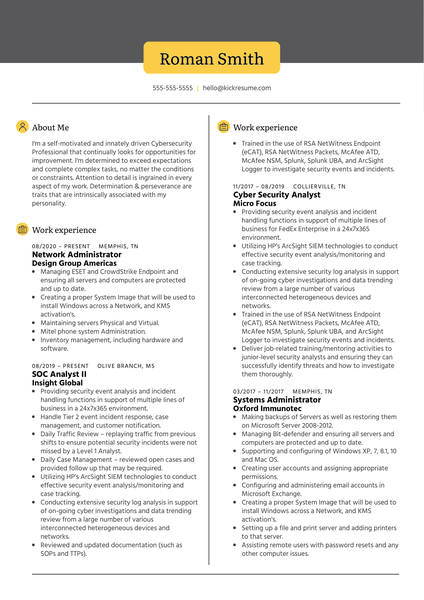
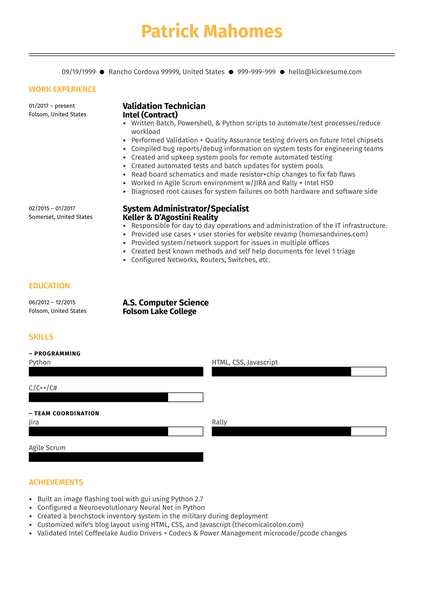
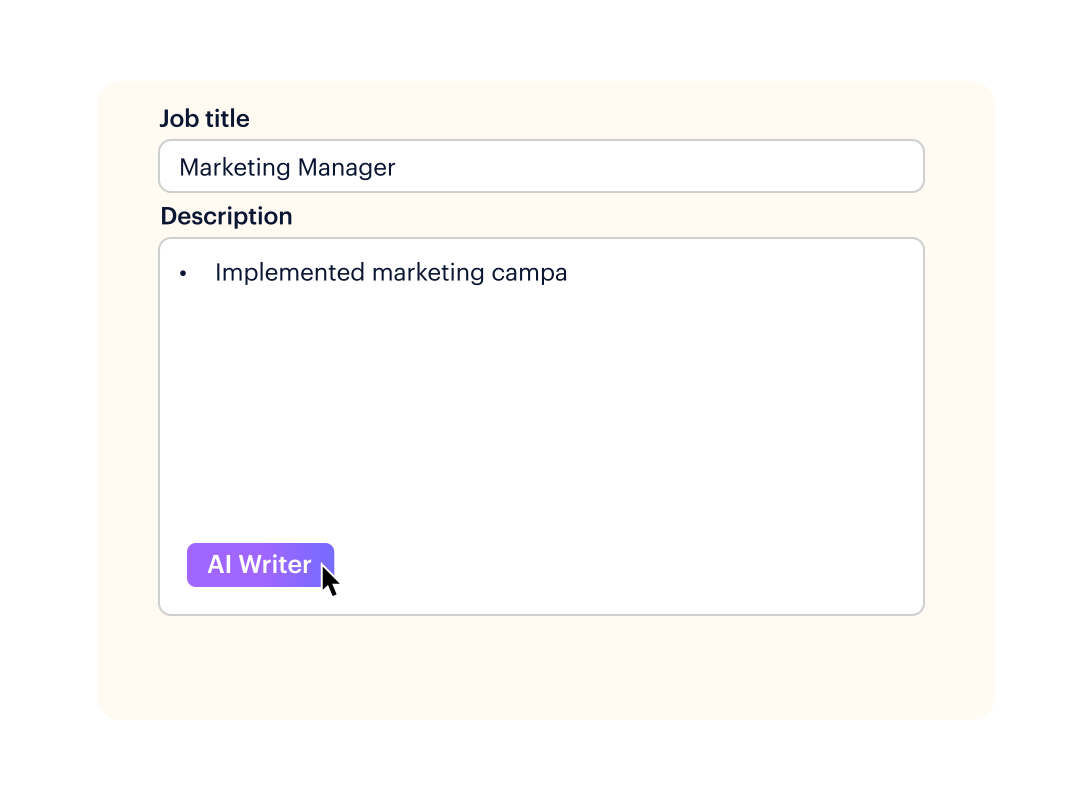

![MercadoLibre Network Analyst Resume Example [ES]](png/thumbnail-1640.png)

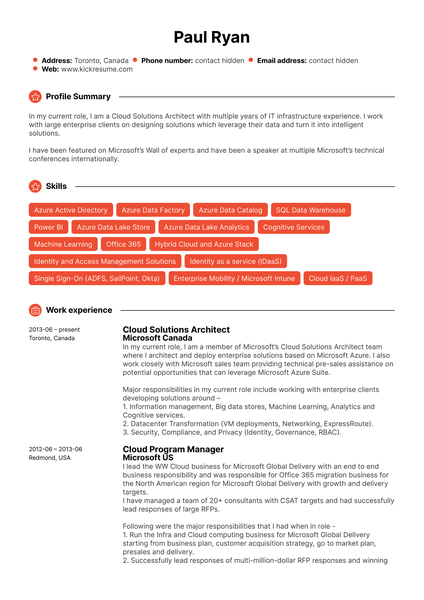
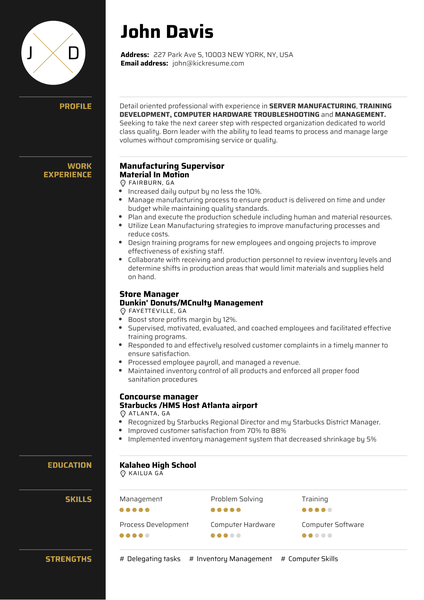

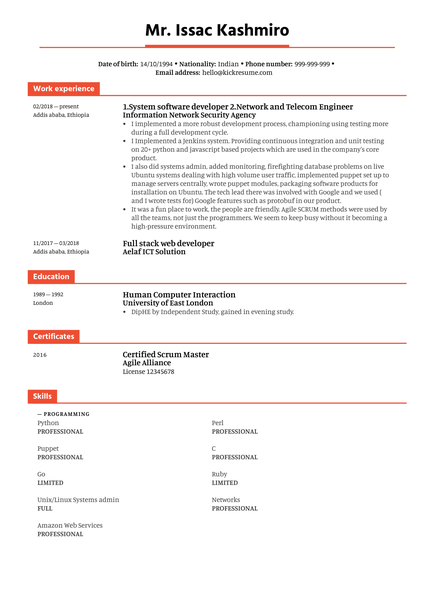


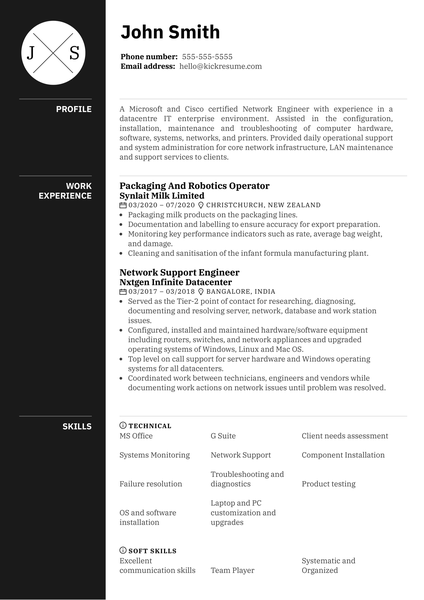

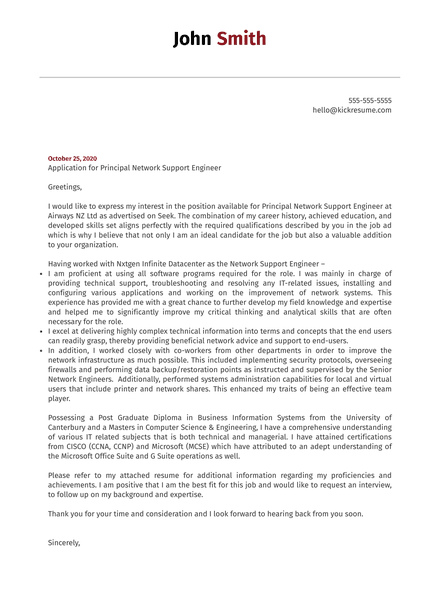
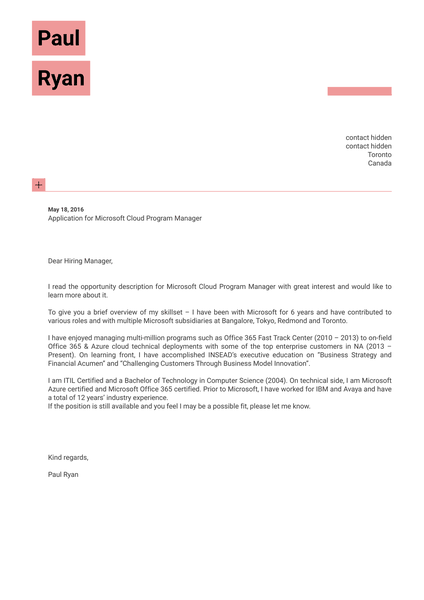
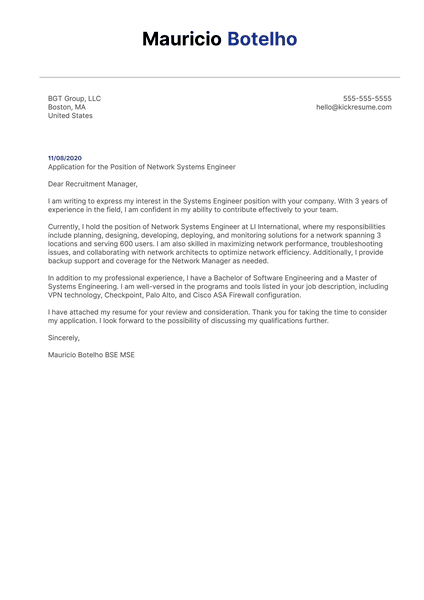
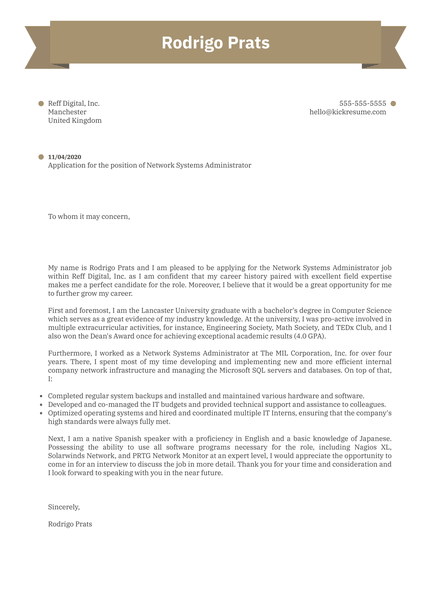

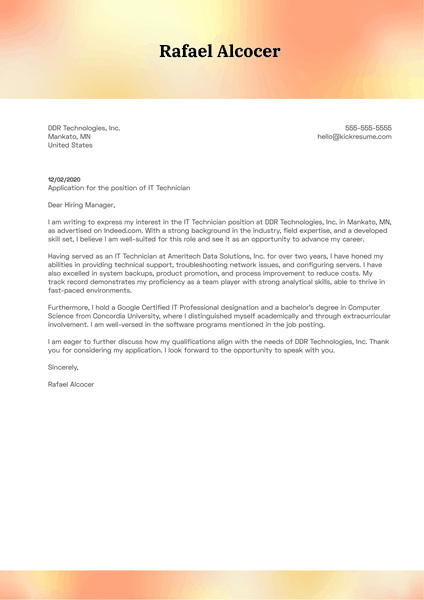

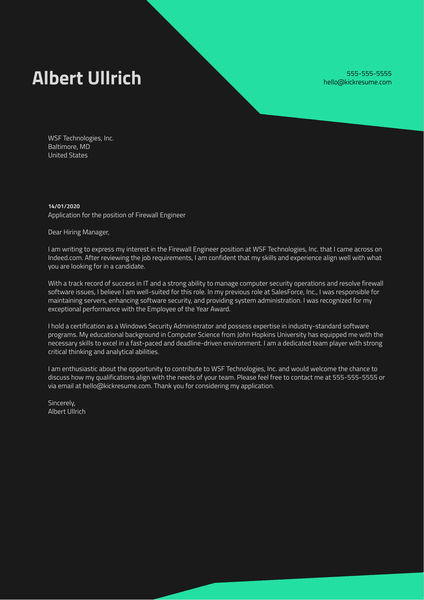
![How to Write a Professional Resume Summary? [+Examples]](https://d2xe0iugdha6pz.cloudfront.net/article-small-images/i-Profile.svg)
![How to Put Your Education on a Resume? [+Examples]](https://d2xe0iugdha6pz.cloudfront.net/article-small-images/i-Collage-Universities.svg)
![How to Describe Your Work Experience on a Resume? [+Examples]](https://d2xe0iugdha6pz.cloudfront.net/article-small-images/Experience.svg)


